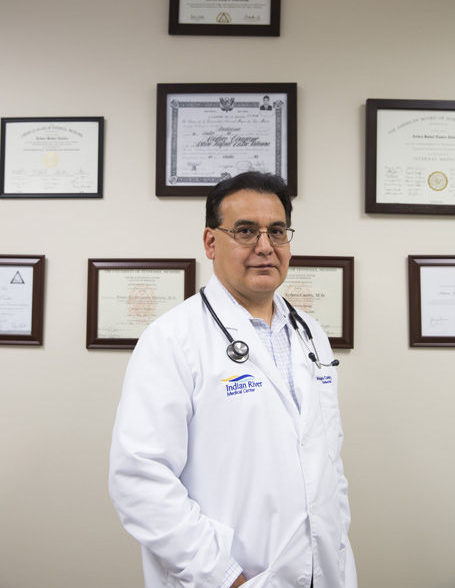
Research published in The New England Journal of Medicine concludes that daily application of a testosterone gel boosts testosterone levels of older men, improving sexual drive and function, mood and walking ability.
Testosterone is a hormone produced primarily in the testicles. In men, it helps maintain sex drive, bone density, muscle strength and mass, facial and body hair, and red blood cell production. (Even though women produce a small amount of testosterone in their adrenal glands and ovaries, it is known as an “androgen” – a male hormone.)
Dr. Arturo Castro, MD, a Vero Beach endocrinologist affiliated with the Indian River Medical Center, says that one outcome of the study reinforces what has long been known: that testosterone therapy for men with low levels of the hormone increases libido (the desire to have sex). “I will prescribe testosterone for men whose levels are clearly low and who are symptomatic,” Dr. Castro says. “But if their issue is primarily the inability to get or maintain an erection, there are more efficient remedies, like Viagra.”
Testosterone levels generally peak during a man’s early adulthood. Levels fall as part of the normal aging process, typically by about 1 percent annually after the age of 30 or 40. There is also a disease – hypogonadism – in which the body is unable to produce normal amounts of testosterone due to a problem with the testicles, or with the pituitary gland that controls the testicles.
The research was done as part of what is called the Testosterone Trials (TTrials), a set of seven studies launched to assess the safety and effectiveness of testosterone treatment among men aged 65 and older. The first three trials focused on sexual function, physical function, and vitality. Researchers screened 51,085 men over the age of 65, identifying 790 who had low testosterone levels and met other study criteria.
The 790 men were divided into two groups. One group applied a testosterone gel daily for a full year, while the other group applied a placebo gel. (It was a double-blind study, which means neither the participants or the researchers knew who was using the actual testosterone gel.) At the start of treatment and after six, nine and 12 months, participants completed questionnaires disclosing their sexual and physical function, as well as their vitality, mood, and symptoms of depression.
Compared to those who used the placebo, participants who used the testosterone gel reported significant improvements in all areas of sexual function – including sexual desire, sexual activity and the ability to get an erection. Participants also reported an improvement in mood and a lessening of symptoms of depression, and could walk a longer distance in a 6-minute walk test.
The researchers also analyzed the men’s blood samples, and found that those who received testosterone therapy had blood testosterone levels that were comparable to those of men aged 19-40.
While the researchers found no differences in adverse events (e.g. heart attack, stroke and prostate problems) between men who received testosterone therapy and those who received the placebo, they stress that no firm conclusions can be made about the safety of testosterone therapy. “To fully evaluate the potential risks of testosterone treatment, a larger and longer study may be needed,” says study co-leader Dr. Christina Wang, of the Los Angeles Biomedical Research Institute in California.
Vero’s Dr. Castro says that past studies about the safety of testosterone therapy are inconclusive. “One study showed an increased mortality, one did not,” he says. He avoids prescribing testosterone for patients with any form of cardiovascular disease, and he prefers gels (like the one used in the study) rather than injections, which he says can have more side effects.
In his practice, Dr. Castro talks to his low-testosterone patients to determine what they want to accomplish though therapy, and then helps them set realistic expectations. He also advises his overweight patients to shed some pounds; he says, “When weight is reduced, testosterone levels go up.”
Dr. Castro’s practice is located at 880 37th Place, Suite 105; the office phone is 772-562-9707.



